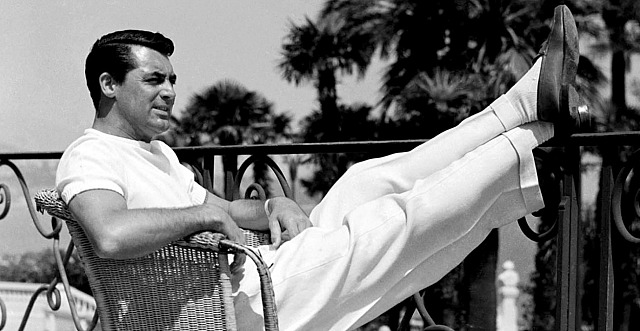From Scott Eyman’s “Cary Grant: A Brilliant Disguise” (Simon & Schuster, 10.20), as excerpted in The Daily Beast:
“[Writer] Bill Royce and Grant even had a conversation about sex. After Royce unburdened himself about his affairs with both men and women, Grant responded by implying he had been basically gay as a young man, later bisexual, still later straight.
“[Randolph] Scott, he said, had seen their relationship as ‘locker-room playing around.’ It had nothing to do with how a man should lead his life. Besides that, at one point Darryl Zanuck had taken Randy aside and told him that enough was enough.

“Grant explained sexuality in terms of performance, of acting. He told Royce that to not completely explore one’s sexuality would be like an actor playing only one character for life. Everybody, he said, had more than one character inside them. He didn’t think homosexual acts were anything to be ashamed of, or, for that matter, proud of. They simply were part of the journey, not necessarily the final destination.
“I think Cary saw the searching I was doing and trusted me. He had been influenced by the Kinsey report and saw sex as a spectrum. Most people think it’s either/or. And there are men like that, but there are also men who are occasionally gay and occasionally straight. I remember one thing Cary said: ‘England is Victorian, but America is more Victorian than England.’
“My sense of it was that he found homosexual life unrewarding. As he got older, he wanted children, and he didn’t think he had any chance at a child as long as he was living that life.
“His conversation with Grant made Royce curious about Randy Scott. He was at the Beverly Hills post office one day when Scott came in to pick up some mail. He was dressed in tweeds, an ascot, had steel gray hair and sported a deep tan, just like Grant. Royce walked over and introduced himself. ‘Mr. Scott, my name is Bill Royce. I help Cary Grant with his place off Benedict and just wanted to thank you for your movies.’
“Scott smiled and said ‘Well, I haven’t seen him in a while. Tell Cary I said hello.’ Royce thought Scott was stunning; he went back to the house and told Grant about how Scott had looked. ‘Yeah, he was really something,’ Grant said, in a tone that combined esteem, fondness, and sadness.”
If you haven’t read Pauline Kael‘s “The Man From Dream City,” a 7.7.75 New Yorker essay, please take it for a spin.









